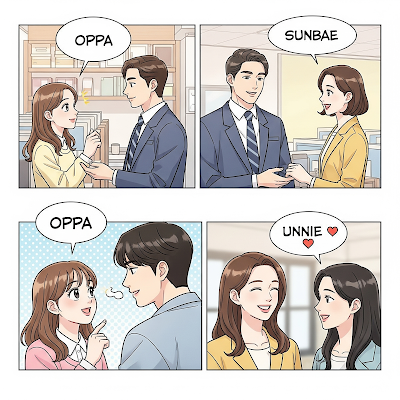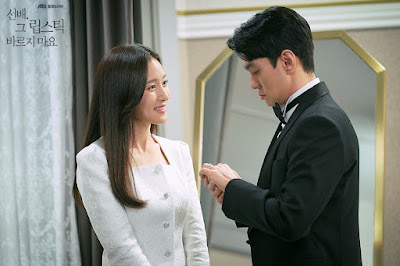Oppa, Sunbae, Unnie: Your Ultimate Guide to Understanding Honorifics (and Age) in K-Dramas
Have you ever been watching a K-drama, and a character gasps because another character suddenly calls them by their first name? The English subtitle might not change much, but you can feel the shift in the air. This is the magic and complexity of Korean honorifics, a system of titles and terms that defines relationships and drives many K-drama plots forward.
Understanding this "language of relationships" can unlock a whole new layer of meaning in your favorite shows. So, if you've ever been confused about who gets to say "Oppa," what a "Sunbae" is, or why finding out someone's age is so important, this guide is for you!
First Things First: Why Age is Everything
In South Korea, age is more than just a number; it establishes a social hierarchy. Knowing someone's age in relation to your own determines how you address them and even how you interact. This is why you'll often see K-drama characters asking each other's birth year shortly after meeting—it's a crucial step in figuring out how to speak to one another respectfully.
The Core Four: The "Family" Honorifics
These are the most common terms you'll hear, and they're not just for actual family!
Oppa (오빠): Used by a female speaking to an older male.
Meaning: It means "older brother," but it's also used affectionately for older male friends, classmates, colleagues, and most famously, a boyfriend or romantic interest. That moment a female lead finally calls the male lead "Oppa" is a classic sign their relationship has leveled up!
Unnie (언니): Used by a female speaking to an older female.
Meaning: "Older sister." It's used for actual sisters and also for close older female friends, mentors, or colleagues. It signifies a close, trusting relationship.
Hyung (형): Used by a male speaking to an older male.
Meaning: "Older brother." This is the cornerstone of male friendships in K-dramas, showing respect and closeness. From best friends to crime-fighting partners, hearing one call the other "Hyung" signifies a strong bond.
Noona (누나): Used by a male speaking to an older female.
Meaning: "Older sister." It can be used for his actual sister, a close older female friend, or a romantic interest, which is the basis for the popular "noona romance" genre.
In the Workplace: Sunbae & Hoobae
This is the senior-junior dynamic you see in offices, hospitals, and universities.
Sunbae (선배): This means "senior." It refers to someone with more experience in a specific field (work, school, etc.), regardless of age (though they are often older). A rookie detective would call a veteran detective "Sunbae."
Hoobae (후배): This means "junior," someone with less experience. The relationship is typically one of respect and mentorship.
The Suffixes of Respect: -nim and -ssi
-nim (님): A high form of respect attached to titles or names. For example, Sajang-nim (사장님, Company President) or Sunbae-nim (선배님, highly respected senior).
-ssi (씨): A polite, neutral suffix attached to a person's first name. It's often used between colleagues who are not close or people of similar social standing. (e.g., Gildong-ssi).
The "A-ha!" Moment: When Honorifics Change
This is where the real drama happens! The moment a character changes how they address someone is a major plot point for viewers to catch.
In Romance: In a drama like "Our Unwritten Seoul", when Park Bo-young's character might switch from calling Park Jin-young's character "[Name]-ssi" to "Oppa," it’s a huge signal that their relationship has crossed from formal/friendly into intimate/romantic territory. The shift is often met with a surprised, heart-fluttering reaction.
In a Thriller: In "Nine Puzzles," if a junior detective (a Hoobae) starts addressing their senior (a Sunbae) more informally, it could signify a breakdown in respect or a shift in their dynamic from professional to personal (either good or bad!).
Journalist's View: What Gets Lost in Translation
This intricate system is one of the biggest challenges for English subtitlers. "선배님, 식사하셨습니까?" (Sunbae-nim, did you eat?) and "형, 밥 먹었어?" (Hyung, did you eat?) can both be translated as "Did you eat?" But the level of formality, respect, and intimacy in the Korean original is vastly different. By paying attention to these honorifics, international viewers can catch subtle but crucial shifts in character relationships that subtitles alone can't fully convey. It allows you to understand the story on a much deeper, more authentic level.
Conclusion: A New Way to Watch
Korean honorifics might seem complex at first, but once you start recognizing them, you'll find it adds a rewarding new layer to your K-drama viewing experience. It's a cultural code that, once cracked, lets you in on the unspoken secrets of every relationship on screen.
What's your favorite "Oppa!" or "Sunbae!" moment in a K-drama? Have you noticed these changes in the dramas you watch? Let's discuss this fascinating aspect of K-dramas in the comments!







.jpeg)
No comments:
Post a Comment